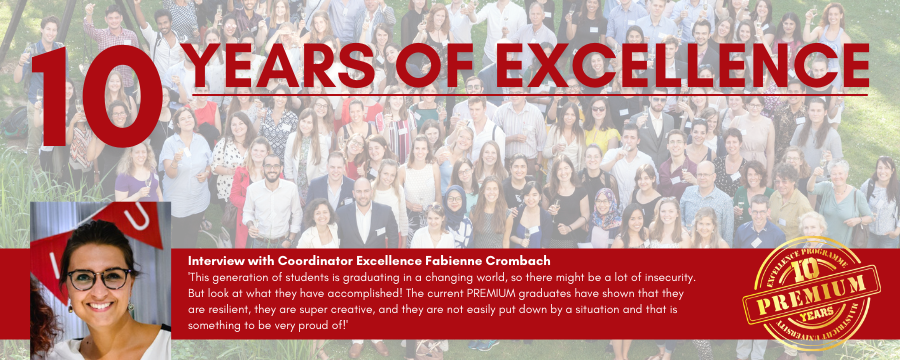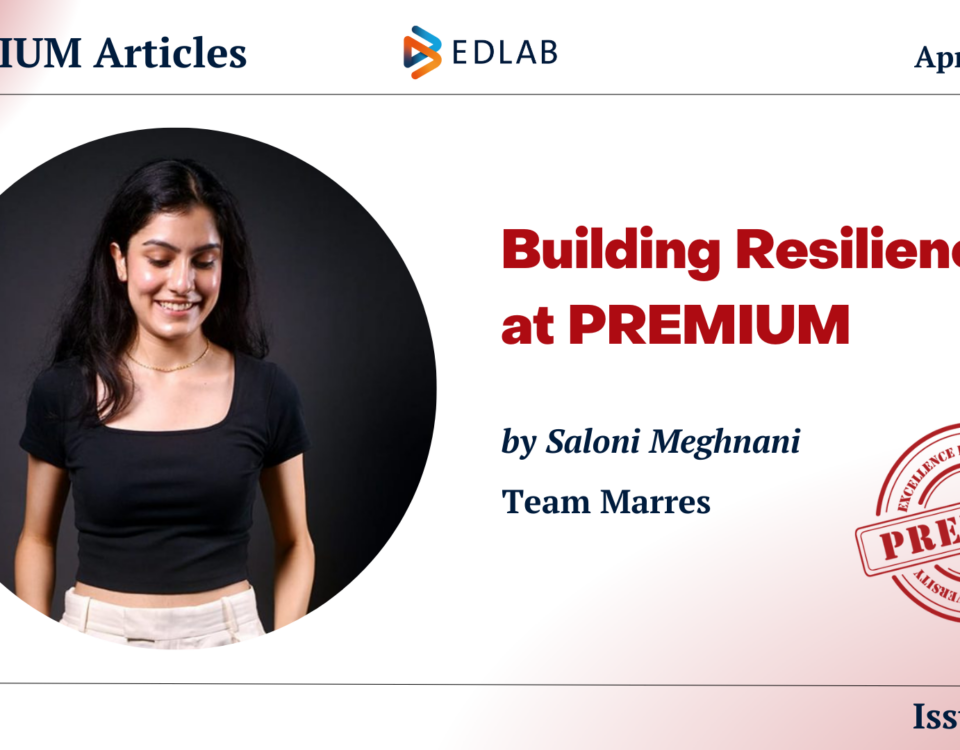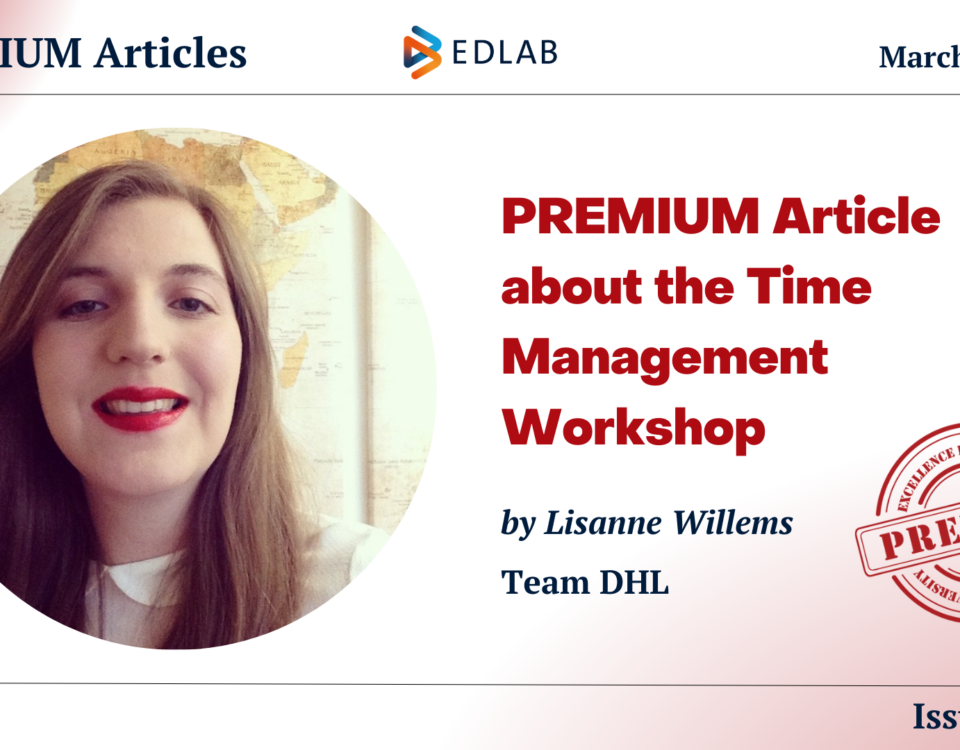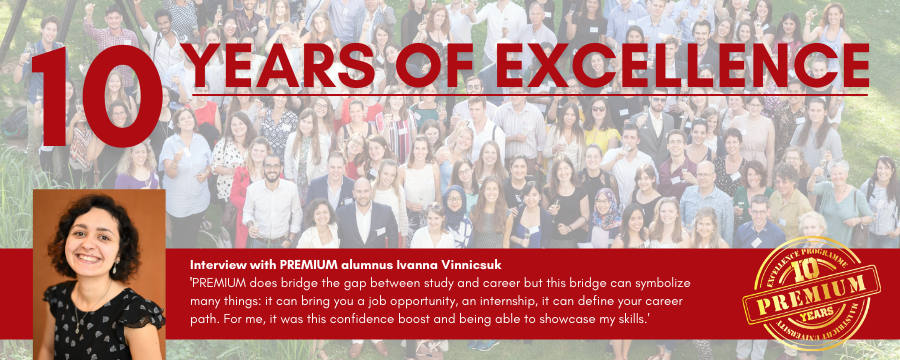
10 years of PREMIUM – A decade of Excellence
12-04-2021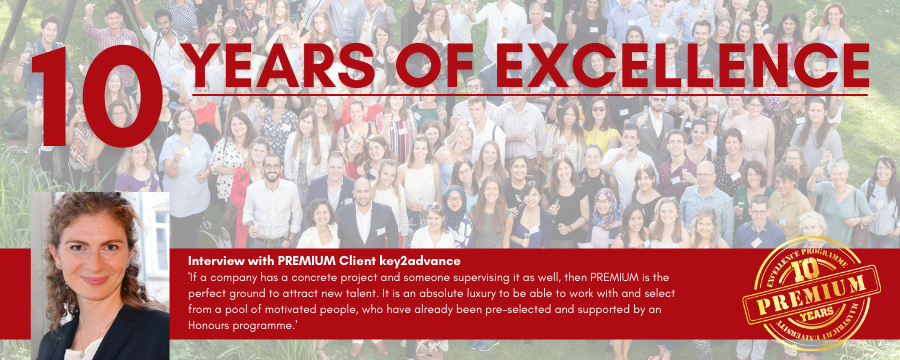
10 Years of PREMIUM – A decade of Excellence
30-04-2021In honor of 10 years of PREMIUM, we look back on what a decade of PREMIUM has meant for our alumni, coaches, mentors, clients and trainers.
Meet the driving force behind PREMIUM! Fabienne Crombach plays a pivotal role in the coordination of the programme. In this article, she takes a trip down memory lane and shares some important milestones, future plans and insights. ‘‘I really love working with PREMIUM students, they are such an inspiration.’’
In 2015, she started working for EDLAB and, together with former PREMIUM Coordinators Ellen Bastiaens and Emma Dekker, she set up certain key components that are the basis of what the programme still is today. In 2017, she officially took over the lead and ever since then she has honored and dedicated her time to develop and maintain a noteworthy, highly professional, and renowned programme. One of her spear points has since then been a personal approach to every individual student. You may count on Fabienne to know everyone’s name and background, usually already during the selection phase of PREMIUM.
One big milestone in your career was winning the Wynand Wijnen Education Prize 2018 (for which we congratulate you). Since then, have you set up new goals for the upcoming years that you wish to achieve in the PREMIUM programme?
‘It is funny that you define it as a milestone in my career, because I never saw it like that. It was not something I actively pursued, especially if you see the academic careers of the past winners. It never even crossed my mind that I would even be eligible for such a thing. It came as a huge surprise to be nominated (because your colleagues need to nominate you), and I did not expect to win, being hugely intimidated by the other nominees. But then I did win, and I did not believe it at first, until they give you the flowers and trophy. To me it felt strange at that point to be awarded a prize for just doing my job which I love doing, like I never understood why that ought to be praised so. Still, I am very grateful because it brought also a lot of exposure to the honours programmes and it showed that people appreciate what I do and that is why you do it in the end. A milestone though, no, I would not call it as such. I have a strange “career” anyhow, always pursuing what I love to do, and not so much having a set plan in mind or certain fields of work, so no set milestones. Come to think of it, that is rather strange, because I am very well organized and I set milestones in the projects I work on, but apparently do not do that when it comes to my career.
For the future, I would like to ensure that PREMIUM remains an honours programme at UM, in a format that suits the aim of the programme “bridging the gap between study and career”, and it will be quite a challenge to see what Covid-19 will do to the job market. What is more, I would like to look into new programmes to offer to those students that would like to further develop their talents and competences. Maybe not those students that have the highest GPA’s, but students that make up for that with drive and motivation and the ability to look beyond the scope of their regular curriculum. ‘
How do you make sure that the programme remains inspiring and innovative to PREMIUM students?
‘That is a good question. I see it as having this constant radar on whether I am working or just socializing or relaxing (best ideas come during holidays when you are completely disconnected from work), but I am constantly thinking if our students can benefit from certain things, try to connect dots all the time. Moreover, I check to see what other honours programmes at universities in the Netherlands do, and we exchange experiences with our colleagues from those universities, so that is always a good way to see what gaps there are in what we offer. I also draw many ideas from interaction with the students themselves, from the clients (what skills do they think are missing) and interaction with colleagues, and check trends and developments.
Covid-19 has been a huge accelerator for innovation as well. I came across an email from last year, right after Covid-19 hit us, in which I listed Zoom as a tool that students could potentially use for teamwork. That feels like decades ago now that Zoom has become more or less the standard. Innovation this year can funnily enough also be seen as retro-vation (I do not believe it is an actual word, but that is how it feels to me); how to create that “feeling from the old days” in an online environment, how do we keep students engaged, but also what effect will it have on their development and their entrance to the job market. Interesting topics that everyone in the educational landscape now works on or concerns themselves with, which give a huge boost to new techniques or skills that we can offer in honours.
Additionally, I try to ensure constantly that PREMIUM is a safe learning experience. Students should feel at ease and free to develop themselves. I try to do that by making them feel at home, trying to get to know them, creating a connection, which for me leads to better engagement. In that sense, this year was an extra challenge with Covid-19 limiting us from so many angles.’
If you were a PREMIUM student yourself: what kind of project would you choose? Which workshops?
‘It would have to be a very practically oriented project in any case. I am a do-er, I need to see progress. So in a group I would probably be the person driving the process, making sure that there is a timeframe, checking to see if everyone is on track (I love to be able to tick of a task, or check a box). My pitfall is that I can get impatient, so I can often relate when I see the same thing happening in PREMIUM teams. Content-wise I am very much interested in projects dealing with history and social sciences. In my free time I love to study anything related to domestic and social history, and I believe that I would have absolutely loved a project on that. Come to think of it, I might contact a living history museum to see if they have a project for PREMIUM next year.
As to workshops, I would probably choose workshops related to leadership and styles of leadership, since I have seen many examples of bad leadership but also examples of excellent leadership that I still draw inspiration from. It fascinates me to see how the dynamic of a group or a situation can change for the better or worse, depending on a certain style of leadership.’
This current PREMIUM cohort has had a more challenging and different programme than other years since most of programme was conducted online. Therefore, with this in mind, what powerful advice would you give to these upcoming (PREMIUM) graduates?
‘I am not sure if it is powerful, but I do know that this generation of students is graduating in a changing world, so there might be a lot of insecurity. But look at what they have accomplished! It is not that we have set the bar lower for PREMIUM this year or that we are more lenient. So, if anything, the current PREMIUM graduates have shown that they are resilient, they are super creative, and they are not easily put down by a situation and that is something to be very proud of. Also, do not take the entire Covid-19 situation and online education as a negative thing; see it as a positive thing. See what it has brought you, see the new skills you learned, you have shown versatility and flexibility and the ability to deal with uncertainty. We have gotten to a point where we can only talk about Covid-19 and how tired we all are of it, and how much we are affected by it. All true, I feel it as well, but by mentioning it all the time and addressing it from that negative perspective, we are also in some way allowing it and taking it for a truth that we are affected by it. When this crisis is done, probably more are to come, and we need to make sure that we can pick ourselves up, dust ourselves off and address the situation with a positive mind-set, and that is when the world will look at the bright minds of the current generation. So know that you matter and you got this! –okay, I did not want to come across like a preacher, but I do wish to make a point here. We keep hearing about our young people being a sort of handicapped generation because of Covid-19 and that would just not do you justice. You have so much potential, and I just do not want such a thing to become self-fulfilling prophecy if you know what I mean.’
What is your best PREMIUM memory so far?
‘Wow, so many great and fun memories during PREMIUM, I cannot choose a particular one. You probably have heard me say it before, but I really love working with PREMIUM students, they are such an inspiration to work with and I am really invested in making the programme worthwhile and meaningful and seeing them prosper. I have good memories of certain events where we hung out afterwards to discuss issues young people are dealing with, but also going to the Gaia Zoo with a bunch of students and staff for a workshop on observation techniques and the link between group dynamics in animal groups and organizations, or just one on one talks with students to help them deal with issues or talk about their future.
I specifically always enjoy the Closing Events, even though I never like to say goodbye to another cohort. The atmosphere is great, we usually have great weather and it is just a very nice way to say goodbye to everyone. We had this amazing improvisational theatre there a couple of years, and the way students participated and their sense of humour was just amazing. Maybe the best memory, if I have to pick one in particular, would be the row of hotel staff, coaches, mentors and clients that formed two rows through which students had to pass after they received their certificates. This was set up spontaneously, and students were handed out a glass of champagne, and had to pass through that corridor of sorts, formed of people clapping and cheering. Many of them were surprised, but others also emotional and the support of the entire community was felt, and that was great.
All in all, it’s just a great programme to coordinate, you work with such a great group of people; colleagues that are coaches and mentors, external clients, and a great coordination team at EDLAB and the faculties. Every one of them is important to the students’ experience, so I count myself lucky that we get to do this every year.’

